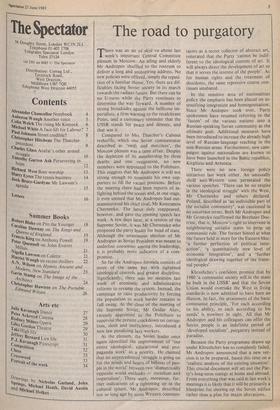The road to purgatory
There was an air of déjà vu about last week's important Central Committee plenum in Moscow. An ailing and elderly Mr Andropov shuffled to the rostrum to deliver a long and uninspiring address. No new policies were offered, simply the repeti- tion of a familiar theme. Yes, there are dif- ficulties facing Soviet society in its march towards the radiant future. But there can be no U-turns while the Party continues to determine the way forward. A number of strong broadsides against the bellicose im- perialists, a firm warning to the recalcitrant Poles, and a customary reminder that the USSR stands for peace and detente, and that was it.
Compared to Mrs Thatcher's Cabinet reshuffle, which one Soviet commentator described as 'swift and merciless', the Moscow plenum was a tame affair. Despite the depletion of its membership by three deaths and one resignation, no new members were appointed to the Politburo. This suggests that Mr Andropov is still not strong enough to nominate his own sup- porters to fill the vacant positions. Before the meeting there had been reports of in- fighting behind the scenes and, at one stage, it even seemed that Mr Andropov had out- manoeuvered his chief rival, Mr Konstantin Chernenko. The latter duly reappeared, however, and gave the opening speech last week. A few days later, at a session of the Supreme Soviet, it was Mr Chernenko who proposed the party leader for head of state. Although the unanimous election of Mr Andropov as Soviet President was meant to underline consensus among the leadership, it is probably more indicative of a com- promise.
So far the Andropov formula consists of more of the same but with tightened ideological controls and greater discipline. Significantly, there was no mention last week of economic and administrative reforms to revamp the system. Instead, the campaign to raise productivity by forcing the population to work harder remains in full swing. At the close of the meeting of the Supreme Soviet, Mr Geidar Aliev, recently appointed to the Politburo to supervise the present crackdown on corrup- tion, sloth and inefficiency, introduced a new law penalising lazy workers.
At the plenum, the Soviet leader once again identified the improvement of 'our entire ideological, educational and pro- paganda work' as a priority. He claimed that an unprecedented 'struggle is going on for the minds and hearts of billions of peo- ple in the world' between two 'diametrically opposite world outlooks — socialism and imperialism'. There were, moreover, fur- ther indications of a tightening up in the cultural sphere. Mr Andropov, described not so long ago by some Western commen- tators as a secret collector of abstract art, reiterated that the Party 'cannot be indif- ferent to the ideological content of art. It will always direct the development of art so that it serves the interest of the people'. As for human rights and the treatment of dissidents, the same repressive course con- tinues unabated.
In the sensitive area of nationalities policy the emphasis has been placed on in- tensifying integration and homogenisation. Since Mr Andopov took over, Party spokesmen have resumed referring to the `fusion' of the various nations into a Russian-speaking Soviet community as the ultimate goal. Additional measures have been introduced to increase the already high level of Russian-language teaching in the non-Russian areas. Furthermore, new cam- paigns against nationalism are known to have been launched in the Baltic republics, Kirghizia and Armenia.
There were no new foreign policy initiatives last week either. An unusually shrill anti-Western tone permeated the various speeches. 'There can be no respite in the ideological struggle' with the West, Mr Chernenko and others declared. Poland, described as 'an indivisible part of the socialist community', was cautioned in no uncertain terms. Both Mr Andropov and Mr Gromyko reaffirmed the Brezhnev Doc- trine, that is, Moscow's right to intervene in neighbouring socialist states to prop up communist rule. The former hinted at what the future held in store for the Eastern bloc: `a further perfection of political inter- action', 'a quantitatively new level of economic integration', and a 'further ideological drawing together of the frater- nal peoples'.
Khrushchev's confident promise that by 1980 'a communist society will in the main be built in the USSR' and that the Soviet Union would overtake the West in living standards is now admitted to have been an illusion. In fact, the attainment of the basic communist principle, 'For each according to his ability, to each according to his needs' is nowhere in sight. All that Mr Andropov and his colleagues can offer the Soviet people is an indefinite period of `developed socialism', purgatory instead of paradise.
Because the Party programme drawn up under Khrushchev has so completely failed, Mr Andropov announced that a new ver- sion is to be prepared, based this time on a `realistic analysis of the existing situation'. This crucial document will set out the Par- ty's long-term stategy at home and abroad. From everything that was said at last week's meetings it is likely that it will be primarily a blueprint for shoring up the Soviet edifice rather than a plan for major alterations.


















































 Previous page
Previous page